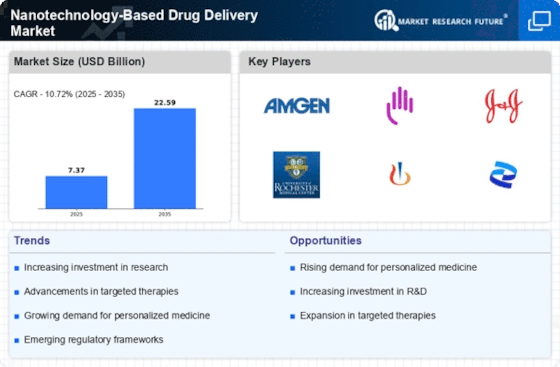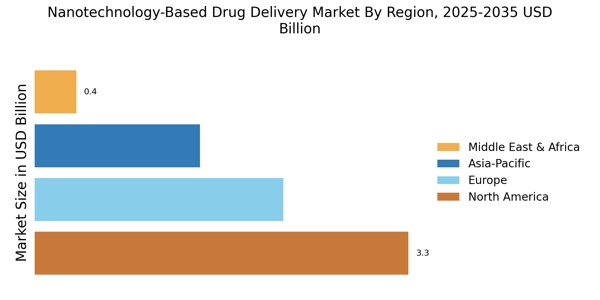Growing Demand for Personalized Medicine
The shift towards personalized medicine is significantly influencing the Nanotechnology-Based Drug Delivery Market. As healthcare moves away from a one-size-fits-all approach, there is an increasing need for drug delivery systems that can be tailored to individual patient profiles. Nanotechnology facilitates the development of customized therapies that can be adjusted based on genetic, environmental, and lifestyle factors. This trend is supported by the fact that the personalized medicine market is projected to reach USD 2.5 trillion by 2025, indicating a robust growth trajectory. Consequently, the integration of nanotechnology in drug delivery systems is expected to play a pivotal role in meeting the demands of personalized healthcare.
Increasing Prevalence of Chronic Diseases
The rising incidence of chronic diseases such as cancer, diabetes, and cardiovascular disorders is a primary driver for the Nanotechnology-Based Drug Delivery Market. As these conditions become more prevalent, the demand for innovative treatment modalities intensifies. Nanotechnology offers the potential for targeted drug delivery, which can enhance therapeutic efficacy while minimizing side effects. According to recent estimates, chronic diseases account for approximately 70% of all deaths worldwide, underscoring the urgent need for effective treatment solutions. This trend is likely to propel investments in nanotechnology research and development, thereby expanding the market for nanotechnology-based drug delivery systems.
Rising Investment in Nanotechnology Research
The surge in investment directed towards nanotechnology research is a significant catalyst for the Nanotechnology-Based Drug Delivery Market. Governments and private entities are increasingly recognizing the potential of nanotechnology in revolutionizing healthcare. Funding for research initiatives has seen a marked increase, with billions allocated to explore novel drug delivery systems. This financial backing is essential for fostering innovation and accelerating the development of new nanotechnology-based therapies. As a result, the market is expected to witness substantial growth, with projections indicating that investment in nanotechnology could exceed USD 100 billion by 2027. This influx of capital is likely to enhance the capabilities and applications of nanotechnology in drug delivery.
Technological Advancements in Nanotechnology
Technological innovations in nanotechnology are propelling the Nanotechnology-Based Drug Delivery Market forward. Recent advancements in nanocarrier systems, such as liposomes, dendrimers, and polymeric nanoparticles, have enhanced the efficiency and effectiveness of drug delivery. These innovations allow for improved bioavailability and controlled release of therapeutic agents, which are crucial for treating complex diseases. The market for nanocarriers is anticipated to grow at a compound annual growth rate (CAGR) of over 10% in the coming years, reflecting the increasing reliance on advanced technologies in drug delivery. As research continues to evolve, the potential applications of nanotechnology in drug delivery are likely to expand, further driving market growth.
Regulatory Support for Nanotechnology Innovations
Regulatory frameworks that support the development and commercialization of nanotechnology-based products are crucial for the Nanotechnology-Based Drug Delivery Market. As regulatory bodies establish guidelines for the safe and effective use of nanomaterials in pharmaceuticals, the pathway for market entry becomes clearer. This regulatory support not only fosters innovation but also instills confidence among investors and stakeholders. Recent initiatives aimed at streamlining the approval process for nanotechnology-based therapies are indicative of a favorable regulatory environment. As these frameworks continue to evolve, they are expected to facilitate the growth of the nanotechnology drug delivery market, potentially leading to a more robust pipeline of innovative therapies.

















